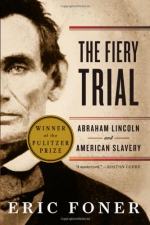
|
| Name: _________________________ | Period: ___________________ |
This test consists of 15 multiple choice questions and 5 short answer questions.
Multiple Choice Questions
1. What is Latin for a statement "said in passing"?
(a) Salovar dictum.
(b) Umber dictum.
(c) Obiter dictum.
(d) Reiter dictum.
2. What were cheap, tabloid-style papers produced in the middle of the 19th century?
(a) Free newspapers.
(b) Nickel press newspapers.
(c) Penny press newspapers.
(d) Pulp fiction.
3. When was the Missouri Compromise enacted?
(a) 1820.
(b) 1865.
(c) 1833.
(d) 1759.
4. What refers to a form of communication that is aimed at influencing the attitude of a community toward some cause or position so as to benefit oneself or one's group?
(a) Tabloid.
(b) Publication.
(c) Propaganda.
(d) Insurrection.
5. Eric Foner won the Bancroft Prize in 1989 for what book?
(a) America's Black Past: A Reader in Afro-American History.
(b) Reconstruction: America's Unfinished Revolution, 1863-1877.
(c) The Story of American Freedom.
(d) A House Divided: America in the Age of Lincoln.
6. To what political party did John C. Fremont belong?
(a) The Whig Party.
(b) The Republican Party.
(c) The Democratic Party.
(d) The Free Soil Party.
7. In what year did Lincoln give a speech denouncing America's new policy regarding slavery in new western territories, as described in Chapter 3?
(a) 1865.
(b) 1854.
(c) 1759.
(d) 1818.
8. What repelled the Missouri Compromise and gave the right of the citizens of new territories to choose whether they entered the Union as a slave or free state?
(a) The Kansas-Nebraska Act .
(b) The Nebraska-Oregon Act.
(c) The Louisiana Act.
(d) The Nebraska-Ohio Act.
9. What does GOP stand for?
(a) Grand Organization of Plenty.
(b) Governor of Politics.
(c) Great Old Politics.
(d) Grand Old Party.
10. When was the author Eric Foner born?
(a) 1943.
(b) 1951.
(c) 1935.
(d) 1940.
11. The Somersett's case in what year emancipated a slave in England and helped launch the movement to abolish slavery?
(a) 1772.
(b) 1782.
(c) 1745.
(d) 1776.
12. James K. Polk was which President of the United States?
(a) 12th.
(b) 11th.
(c) 10th.
(d) 13th.
13. In the late 1850s, Lincoln argued that what would be much more profitable if brought to the South because the workers would much better motivated to work if they were promised wages at the end of the day?
(a) Slavery.
(b) Labor unions.
(c) Free labor.
(d) Colonialization.
14. Who was the 13th President of the United States?
(a) Abraham Lincoln.
(b) Henry Clay.
(c) Millard Fillmore.
(d) Zachary Taylor.
15. How many members comprise the U.S. House of Representatives?
(a) 522.
(b) 120.
(c) 615.
(d) 435.
Short Answer Questions
1. When was John C. Fremont born?
2. Henry Clay represented what state in both the Senate and the House of Representatives?
3. When was James Buchanan born?
4. The Whig party began to fracture in the early part of what decade?
5. What is the framework for the organization of the United States government and for the relationship of the federal government with the states, citizens, and all people within the United States?
|
This section contains 419 words (approx. 2 pages at 300 words per page) |

|




